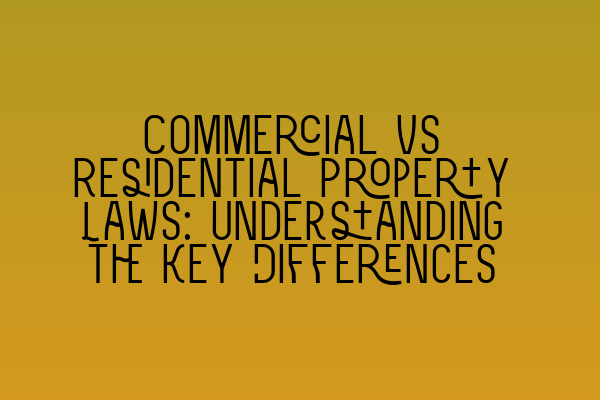Commercial vs Residential Property Laws: Understanding the Key Differences
When it comes to property law, there are significant differences between commercial and residential properties. These differences encompass various areas, including ownership rights, leases, regulations, and legal considerations. Whether you are a property investor, landlord, tenant, or solicitor, understanding these key distinctions is crucial to navigating the complex world of property law.
In this blog post, we will delve into the important divergences between commercial and residential property laws, shedding light on how they impact different aspects of property ownership and management. So without further ado, let’s explore the unique characteristics of each category!
1. Ownership Rights:
In residential property law, ownership rights typically grant individuals exclusive possession of their homes, allowing them to use and enjoy the property within legal constraints. Residential homeowners also have the right to sell, transfer, or mortgage their properties, subject to certain legal requirements and local regulations.
On the other hand, commercial properties often involve more complex ownership structures. In many cases, commercial properties are owned by legal entities, such as corporations or partnerships, rather than individuals. These ownership structures can have implications for liability, taxation, and other legal considerations.
2. Leases:
Leases are another critical area where commercial and residential property laws differ significantly. Residential leases are primarily governed by consumer protection laws, ensuring tenants’ rights to a safe and habitable living space. These leases often have strict regulations regarding rent increases, eviction procedures, and repairs.
In contrast, commercial leases are more flexible and tend to involve negotiations between landlords and tenants. The terms and conditions of commercial leases can vary greatly, allowing for more customized agreements between the parties involved. Commercial leases may include provisions related to rent escalations, tenant improvements, and leasehold interests, among other factors.
3. Regulations:
When it comes to regulatory frameworks, commercial and residential properties are subject to different sets of rules and regulations. Residential properties are usually subject to local housing regulations, building codes, and health and safety standards to protect the well-being of tenants. These regulations aim to ensure that residential properties meet certain standards of habitability and are safe for occupancy.
Commercial properties, on the other hand, are subject to a broader range of regulations, including zoning laws, land use restrictions, and business licensing requirements. These regulations are designed to govern and control the use of commercial properties based on their intended purpose, ensuring compliance with local planning policies and community needs.
4. Legal Considerations:
From a legal standpoint, commercial and residential property laws also diverge in terms of legal considerations. When disputes or conflicts arise, the legal processes and remedies available may differ based on whether the property is commercial or residential.
Residential property disputes often involve issues such as landlord-tenant disputes, eviction proceedings, or breaches of lease agreements. These disputes are typically resolved through civil courts, and the laws governing such matters prioritize the protection of tenants’ rights.
On the other hand, commercial property disputes often revolve around contract breaches, property damage, or disputes between business tenants and landlords. Resolution mechanisms, such as arbitration or mediation, may be more common in commercial property disputes, and the laws governing commercial disputes tend to prioritize commercial interests and contractual agreements.
In conclusion, understanding the differences between commercial and residential property laws is essential for property owners, investors, and legal professionals. Each category has its unique set of considerations, rights, and regulations that must be considered when dealing with property matters.
Whether you are involved in residential or commercial property transactions, it is crucial to seek legal advice from experienced solicitors who specialize in property law. At SQE Property Law & Land Law, our team of dedicated specialists can provide expert guidance and support to navigate the complexities of property law.
If you found this article helpful, be sure to check out our related articles for more valuable insights:
– Unlocking Legal Research Skills for SQE Success
– Essential SQE Textbooks: Building a Solid Foundation for Exam Prep
– Unraveling the SQE Stages: A Roadmap to Success
– Test Centers for SQE: Convenient Locations for the Exam
– Transitioning from LPC to SQE: Navigating the New Qualification Pathway
For more information and legal resources, visit our website at SQE Property Law & Land Law. We are here to help you succeed in your property law journey.
